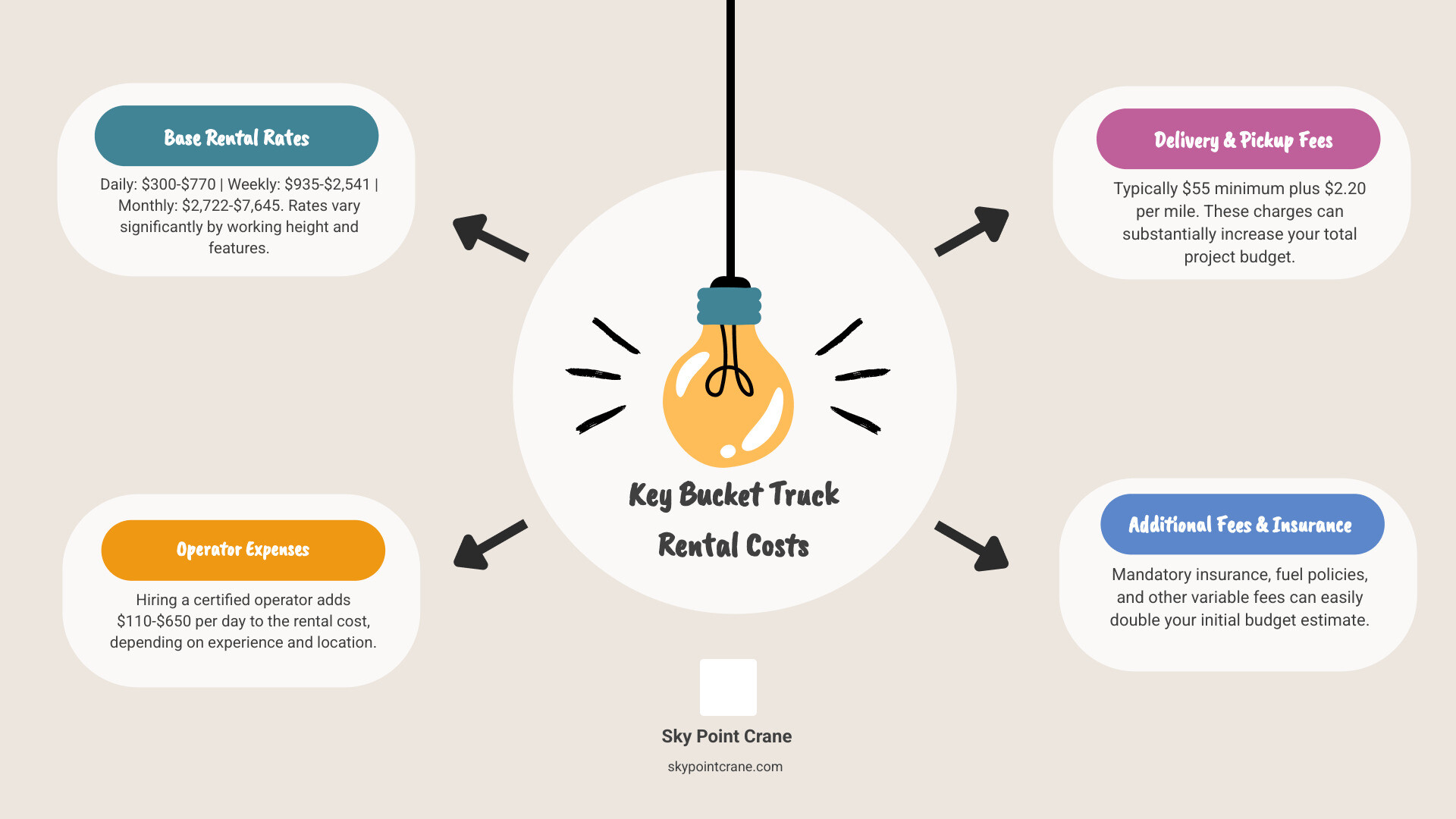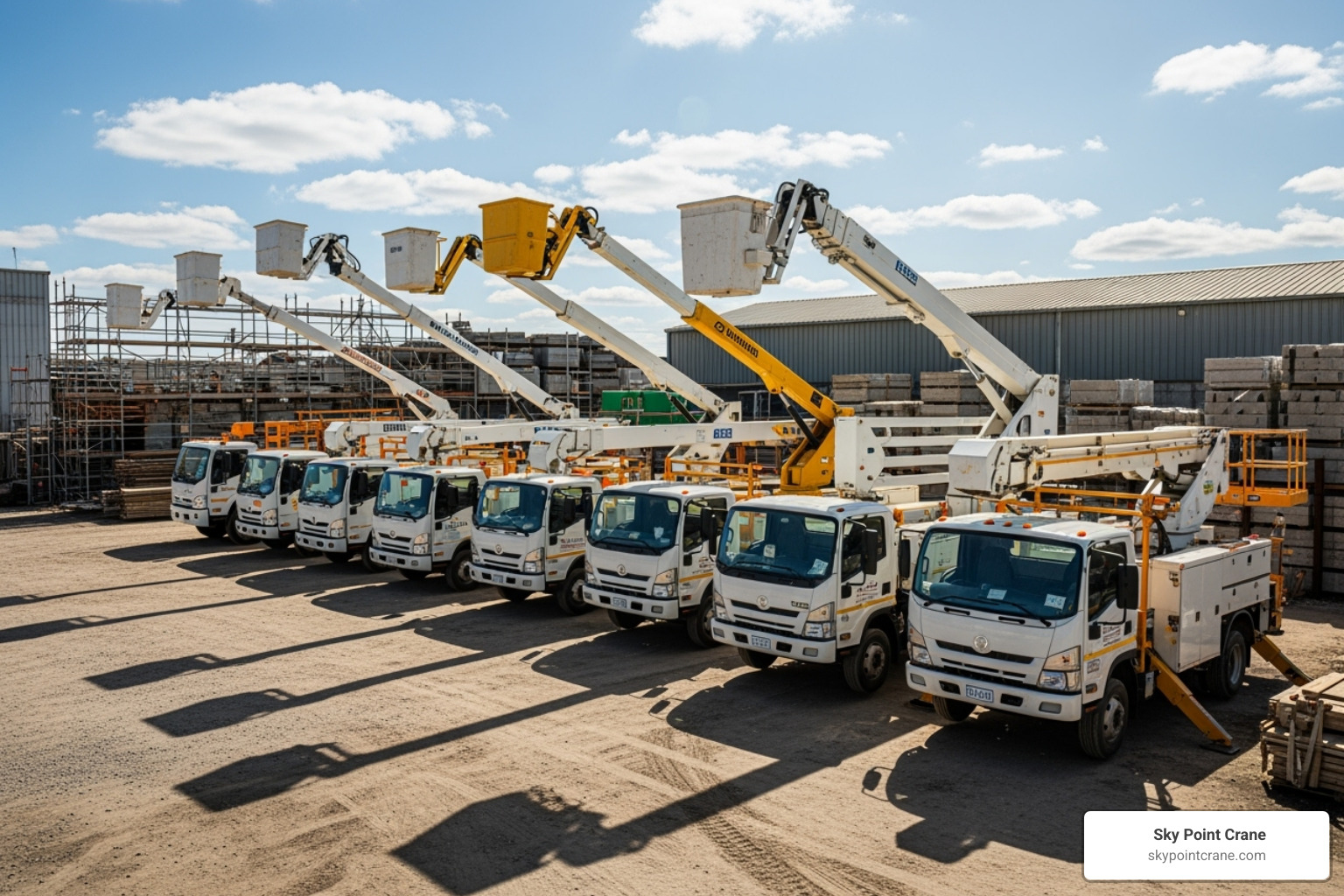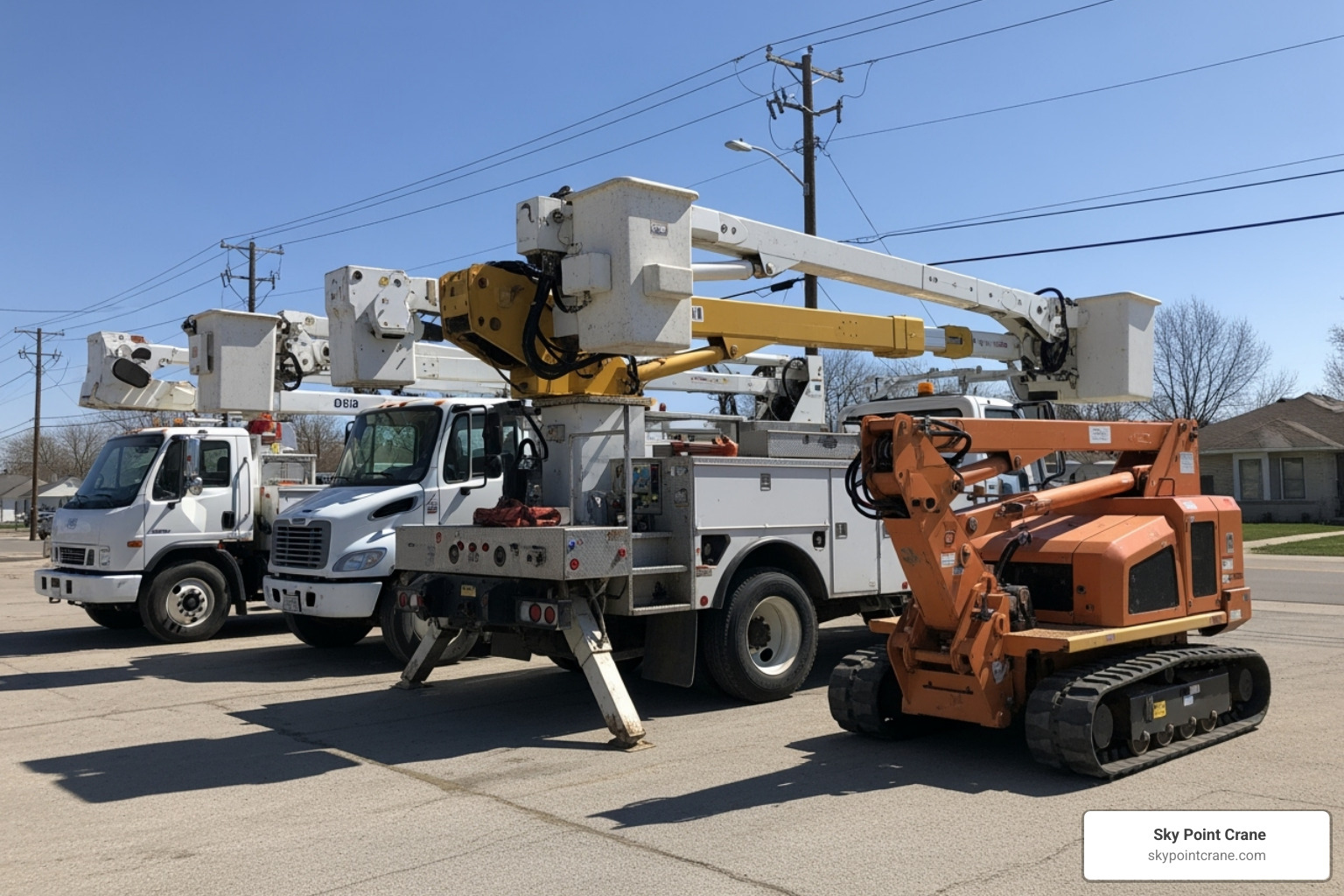Understanding the True Cost of Bucket Truck Rentals
When your project requires work at height, the bucket truck rental cost is a critical part of your budget. Whether for tree trimming, sign repair, or utility maintenance, knowing the full price is key. Here’s a quick look at what to expect:
Quick Answer: Bucket Truck Rental Costs
- Daily rates: $300-$770 depending on height and features
- Weekly rates: $935-$2,541 for most applications
- Monthly rates: $2,722-$7,645 for extended projects
- With operator: $110-$650 per day additional
- Key factors: Working height, rental duration, delivery fees, insurance
Based on industry data, a standard 40-foot bucket truck typically rents for around $300-400 per day, while specialized 75-foot units can cost $467-770 daily. These base rates don’t include delivery fees (often $55+ minimum plus $2.20 per mile), insurance requirements, or operator costs if needed.
The challenge isn’t just finding equipment – it’s understanding the total project cost. As one construction professional noted, “The higher up you go the more expensive it gets,” and delivery, insurance, and operator fees can easily double your initial estimate.
I’m Dave Brocious, and with over 30 years in the equipment rental industry, I’ve helped contractors across Western Pennsylvania manage bucket truck rental cost. At Sky Point Crane, I’ve seen how understanding these costs upfront saves thousands on lifting projects.

Related content about bucket truck rental cost:
Decoding the Average Bucket Truck Rental Cost
Figuring out bucket truck rental cost can be confusing, with varying quotes and hidden fees. However, the pricing follows predictable patterns based on average figures. The most consistent rule is that longer rentals lead to lower daily rates, rewarding commitment with significant savings.
Here’s what you can typically expect to pay based on working height:
| Working Height | Daily Rate (Approx.) | Weekly Rate (Approx.) | Monthly Rate (Approx.) |
|---|---|---|---|
| 28′ to 32′ | $302.50 | $935.00 | $2,722.00 |
| 36′ to 46′ | $330.00 | $1,017.50 | $3,074.00 |
| 48′ to 54′ | $357.50 | $1,100.00 | $3,410.00 |
| 55′ to 60′ | $368.50 – $750.00 | $1,215.00 – $3,500.00 | $3,685.00 – $4,950.00 |
| 65′ to 75′ | $467.50 – $770.00 | $1,402.00 – $2,541.00 | $4,207.00 – $7,645.00 |
| 80′ to 100’+ | $770.00 | $2,541.00 | $7,645.00 |
Note: These figures are approximations based on available data and can vary significantly by location, specific equipment features, and rental provider.
The economies of scale are clear: a truck costing $357.50 daily can drop to around $157 per day on a monthly rental. This highlights the value of planning ahead. The wide price ranges in higher categories reflect the variety in equipment, from basic models to specialized trucks with features like insulated booms.

How Working Height Impacts Rental Rates
Unsurprisingly, the higher you need to go, the more you’ll pay, and costs climb quickly. A 40-foot truck might cost $330 daily, while a 60-foot unit can range from $368 to $750. Reaching 75 feet or more can cost $467 to over $770 per day. This jump is due to engineering complexity—taller trucks require stronger booms, better stabilization, and more robust hydraulics, increasing manufacturing and maintenance costs.
Side reach is also a key cost factor. Trucks that can extend horizontally over obstacles have sophisticated articulating booms, which adds to the rental price. While a 45-foot truck may suffice for simple jobs, the extra cost for a 60-foot reach is justified when safety around obstacles like power lines is paramount.
Understanding Rental Duration Pricing
Rental pricing rewards longer commitments.
- Daily rates are the most expensive per day and are best for jobs confirmed to take less than a day.
- Weekly rates offer significant savings. A truck at $357.50 daily might be $1,100 weekly, making it cheaper for any job lasting four days or more.
- Monthly rates provide the best value for extended projects. The same truck could cost around $3,410 monthly (about $113/day), a massive saving for ongoing work.
Accurately estimating your timeline is crucial. Extending a daily rental often costs more than booking a weekly rate from the outset.
The Cost Difference: With vs. Without an Operator
A key decision affecting bucket truck rental cost is whether to hire an operator.
- Bare rentals (equipment only) are the base rates of $300-$770 per day. You are responsible for providing a qualified operator, fuel, and insurance.
- Rentals with an operator have higher upfront costs but can be more economical overall. Expect to pay $110-$150 per hour (with minimums) or daily rates of $650-$850+.
Hiring a certified operator is wise if your team lacks certification, the job is complex, or safety is paramount. At Sky Point Crane, our NCCCO certified operators serve Pennsylvania, Ohio, West Virginia, and Maryland, preventing delays and accidents. This option also simplifies insurance, as the operator’s employer typically covers liability for equipment operation.
Key Factors That Drive Your Final Price
Beyond height and duration, your final bucket truck rental cost depends on the truck’s specific features and capabilities. Understanding these factors helps you get an accurate quote and avoid surprise charges.

- Insulated vs. non-insulated booms: Working near power lines requires an insulated boom for safety, which comes at a premium compared to standard non-insulated trucks used for general tasks.
- Material handling capabilities: Trucks with jibs or winches can lift equipment and personnel, but this versatility increases the rental rate due to their specialized engineering.
- Gross Vehicle Weight Rating (GVWR): This indicates the truck’s maximum operating weight. Higher GVWR trucks can handle heavier loads but are more robustly built, leading to higher rental costs.
- All-Wheel Drive (AWD) options: AWD is essential for rough terrain on construction or forestry sites. This added capability comes at a premium compared to standard 2WD models.
- Specialized truck types: Forestry units with chip boxes or track-mounted machines for difficult access have unique pricing. For example, track machines can rent for $770 or more per day.
How to Estimate Your Bucket Truck Rental Cost
To get an accurate bucket truck rental cost quote, prepare the following information:
- Job Height & Reach: Measure both vertical height and horizontal reach needed.
- Rental Duration: Estimate if you’ll need the truck for a day, week, or month to get the best rate.
- Required Features: Specify needs like insulated booms, material handling, AWD, or platform capacity.
- Operator Needs: Decide if you’ll provide a certified operator or need one included.
- Clarify All Fees: Ask about delivery, insurance, fuel, and other charges beyond the base rate.
For specialized lifting projects in Western and Central Pennsylvania, Ohio, West Virginia, or Maryland, contact Sky Point Crane with these details for a comprehensive quote.
Additional Fees to Budget For
The base rental rate is just the starting point. Budget for these common additional costs:
- Delivery and Pickup: These charges can be significant, often a flat fee plus a per-mile rate (e.g., $55 minimum plus $2.20/mile). A 50-mile delivery could add $275.
- Insurance: You must have adequate coverage. If your policy doesn’t cover rentals, you may need to buy a plan from the rental company, which can cost around 14% of the rental fee.
- Fuel: Return the truck with a full tank to avoid expensive refueling charges from the rental company.
- Environmental Fees & Taxes: These vary by location and cover things like fluid disposal and standard sales tax.
- Late Return Fees: Returning equipment late can result in steep penalties, often a full extra day’s rental charge.
Always ask for a full breakdown of fees upfront to create an accurate budget.
How to Find the Most Cost-Effective Rental
Finding the most cost-effective rental isn’t about the lowest daily rate, but the best overall value. Strategic planning can significantly reduce your bucket truck rental cost while ensuring you get the right equipment for a safe and successful job.

- Match Equipment to Your Needs: Don’t over-rent. A towable lift (~$190/day) may be more economical for tight spaces than a full truck (~$400+/day).
- Compare Essential Features: Only pay for what you need. An insulated boom is vital for electrical work but unnecessary for other tasks. A single-person bucket is cheaper if you’re working alone.
- Time Your Rental: Rent during off-peak seasons (like winter for outdoor work) to find potential discounts and better negotiation power.
- Negotiate Long-Term Rates: For projects lasting several weeks, ask about negotiable monthly rates, which can offer substantial savings over weekly renewals.
- Compare National vs. Local Companies: National chains offer large fleets, but local providers may offer more flexibility, personalized service, and competitive rates.
Estimating Costs for a Specific Task: Tree Trimming
Tree trimming is a common use for bucket trucks, highlighting the DIY vs. professional service dilemma.
- DIY Rental Costs: A homeowner might spend $1,200 on a two-day rental to trim large trees, saving money compared to a professional quote. However, this doesn’t account for the time, physical labor, and significant safety risks involved. The renter is responsible for all costs (rental, delivery, fuel, insurance) and all liability.
- Professional Service Costs: A professional service might cost $1,500 but includes an experienced crew, all necessary equipment (including chippers), disposal, and comprehensive insurance. The job is often completed in a fraction of the time with far less risk.
- Specialized Equipment Needs: The bucket truck rental cost for tree work increases if you need specialized equipment, like an insulated boom for work near power lines or a forestry truck with a chip box.
The choice depends on your experience, time, and risk tolerance. For simple jobs, a DIY rental may be feasible. For complex or dangerous work, a professional service often provides better value and peace of mind. At Sky Point Crane, we help customers in Western Pennsylvania evaluate these factors to ensure safety and efficiency.
Frequently Asked Questions about Bucket Truck Rentals
Here are answers to the most common questions about bucket truck rentals to help you feel confident about your decision.
What kind of license do you need to operate a bucket truck?
The license required depends on the truck’s size.
- Commercial Driver’s License (CDL): Generally required for trucks with a Gross Vehicle Weight Rating (GVWR) of 26,001 lbs or more.
- Non-CDL Options: Smaller trucks with a GVWR under 26,001 lbs can often be operated with a standard driver’s license. Towable lifts also do not require a CDL.
Regardless of the license, operator certification and safety training are mandatory. OSHA requires that every operator be trained on the specific lift they are using, covering safe operation and hazard recognition. At Sky Point Crane, our NCCCO certified operators meet the highest safety standards. Never compromise on operator qualifications.
Is it cheaper to rent a bucket truck or hire a service?
The best choice depends on your needs and experience.
- Hiring a Service: For one-off jobs, this is often cheaper and safer. The price includes the equipment, a skilled operator, fuel, and insurance, eliminating hidden costs and liability concerns. A professional can often do the job faster and more safely than a DIYer.
- Renting: For contractors with multiple projects and certified operators on staff, renting can be more economical. This is best for those with frequent, ongoing needs for aerial access.
The key factors are insurance, liability, and expertise. Unless you have regular aerial work, a professional service usually offers better value and peace of mind. For complex projects in our service area (PA, OH, WV, MD), Sky Point Crane provides comprehensive solutions that prioritize safety and efficiency.
Can I rent a bucket truck for just a few hours?
Unfortunately, most rental companies have daily minimums for equipment-only rentals. The logistics of preparing, delivering, and picking up a truck make hourly rentals impractical. The costs for the rental company are the same whether you use it for one hour or eight.
Some companies may offer hourly rates (e.g., $110-$150/hour) with a minimum of a few hours, but this usually includes a certified operator.
Always clarify the minimum rental period when getting a quote. For a very short job, hiring a professional service that can fit your task into their schedule is often the most cost-effective solution. Plan to budget for at least a full day’s rental when considering your bucket truck rental cost.
Your Partner for Safe and Efficient Lifting
When it comes to bucket truck rental cost, the numbers on paper only tell part of the story. You’ve learned that daily rates can range from $300 to $770 depending on height, that weekly and monthly rentals offer significant savings, and that additional fees for delivery, insurance, and operators can easily double your initial budget estimate.
But here’s what the numbers don’t capture: the peace of mind that comes from working with experienced professionals who understand the complexities of aerial work.
The real cost consideration isn’t just what you pay upfront – it’s what you might pay if something goes wrong. When you’re working at height, whether it’s trimming trees near power lines or installing heavy signage, the margin for error is slim. One miscalculation, one moment of inexperience, and you could be facing medical bills, property damage, or worse.
This is especially true for complex lifting projects that go beyond basic bucket truck work. When your project requires meticulous planning, certified operators, and comprehensive safety protocols, the value equation shifts dramatically. You’re not just renting equipment – you’re investing in expertise that can prevent costly mistakes and ensure your project stays on schedule.
For challenging projects across Pennsylvania, Ohio, West Virginia, or Maryland, Sky Point Crane brings more than just equipment to the table. Our NCCCO certified operators have the training and experience to handle complex lifting scenarios safely. We provide 3D Lift Planning to visualize potential challenges before they become problems, and our 24/7 service means you’re never left stranded when deadlines loom.
The bottom line? Understanding bucket truck rental cost is about more than finding the cheapest daily rate. It’s about finding the right balance of capability, safety, and value for your specific project. Whether you decide to rent equipment yourself or partner with a professional service, the key is making an informed decision based on your project’s complexity, your team’s expertise, and your tolerance for risk.
Ready to discuss your next lifting challenge? Request a Quote for your next project and find how professional lifting solutions can actually save you money in the long run.
